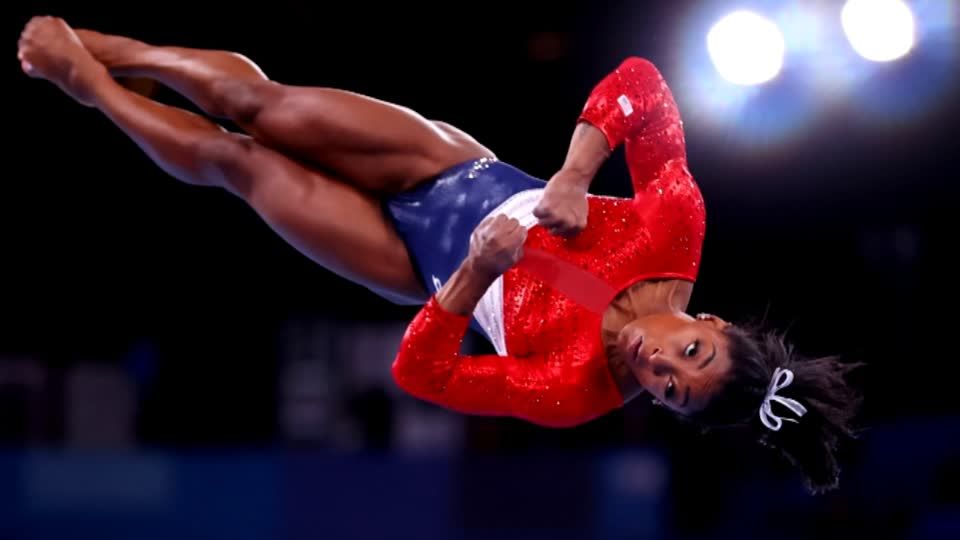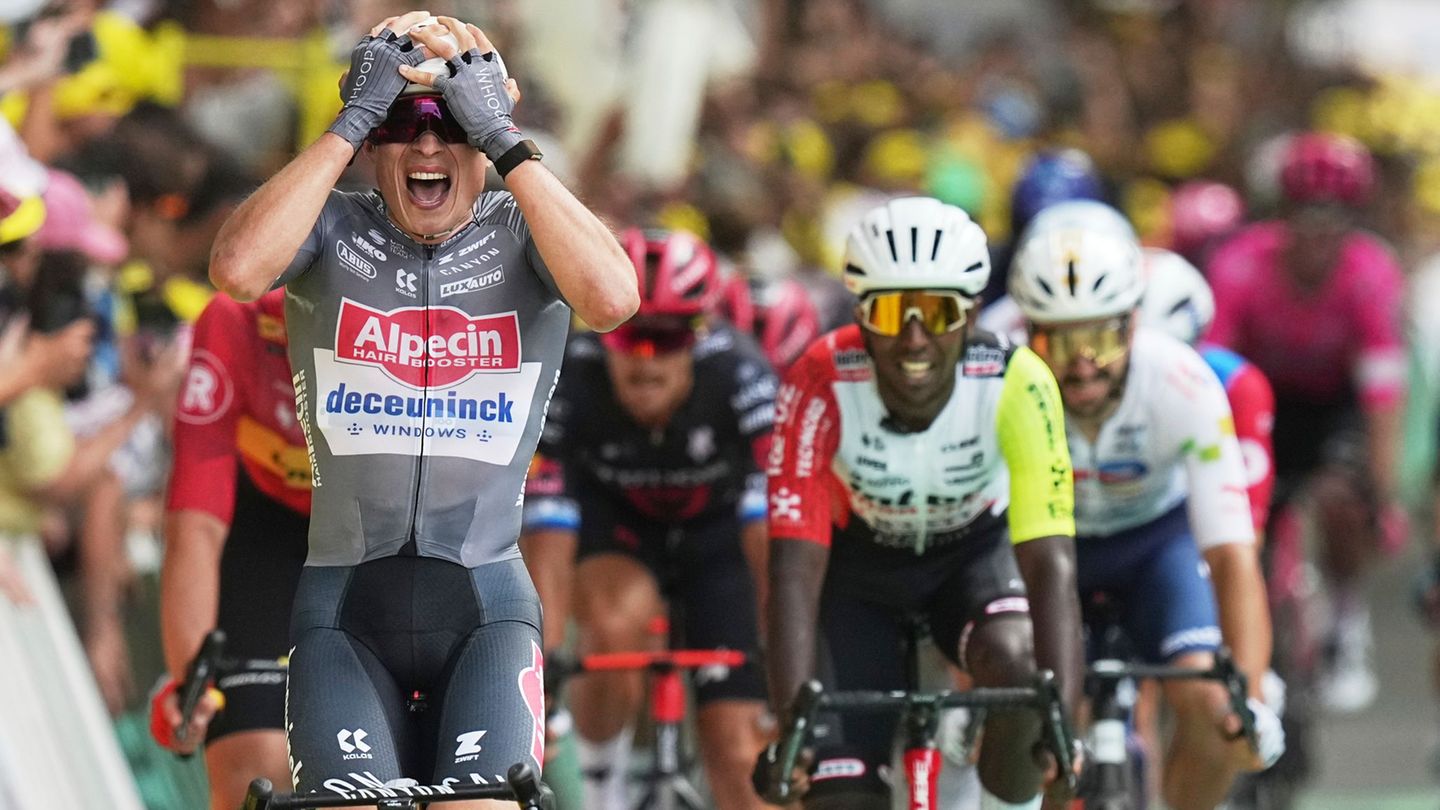Star gymnast Simone Biles has had a rocky road behind her – with failure on the biggest stage, depression, abuse. She has been a part of the sport for a long time, now the Olympics again?
The bass vibrates like a heartbeat. Six times. “…Ready For It?” by Taylor Swift booms from the speakers. Of course, the best gymnast in the world steps onto the mat with the music of the biggest pop star in the world. And Simone Biles gets going.
After a two-year break, she is more than ready for her third Olympic Games. Biles would not need to compete in Paris. The exceptional gymnast has won 37 medals at world championships and Olympic Games. Five gymnastics routines, called elements, are named after her – so far. Shortly before her freestyle routine, she announced a sixth one, which she wants to perform on Sunday morning. After her last games in Tokyo, she thought her career was over.
The low point comes at the Olympics
Summer 2021. The corona pandemic has brought everything to a standstill. The virus is not stopping even at the biggest sporting event in the world. The Olympic Games are taking place in Japan. The requirements are high. Family or companions for the athletes are not allowed. The pressure is too high. Even for an exceptional athlete like Biles. At this point, the gymnast has been suffering from “twisties” for weeks, as they are called in gymnastics, meaning she loses her orientation when jumping. She breaks off after the first exercise, causing a stir in the sporting world. She justifies the break with her mental health.

Mental health: Star gymnast Biles cancels participation in all-around final
01:22mins
Three years later, she recalls: “If my ankle had been broken, I might have competed,” Biles says in a recent Netflix documentary about her life. “But that wasn’t the case. Given my mental and physical condition, I could have injured myself much more seriously than my ankle.”
For the 27-year-old, daring jumps are not an exception, but rather standard. If she loses her bearings, she could be seriously injured or even die. However, it is a real exception that an athlete at this level puts her mental health first.
Drugs, abuse, depression
The “demons” she speaks of after the Olympics were canceled have a long history. Biles’ biological mother had a drug and alcohol problem, and her four children were taken away from her. As a toddler, she was in a foster home before her grandparents adopted her and her little sister. The grandparents, whom she calls her parents, took her to gymnastics and immediately recognized little Simone’s talent.
She enjoyed early success in competitive sports. Her career peaked at the 2016 Olympic Games in Rio. She won five medals there, four of them gold. Then came the depression. “After the trip, I thought: I’ve achieved everything at 19. What the hell am I going to do with the rest of my life?” Biles says in the Netflix documentary. “All I knew was that I had to rest. But I couldn’t.” Then came the media reports.
The success of the US athletes was created by a system that ruined those involved. What was considered the gold standard of training at the time and brought success goes far beyond negligence. The US Gymnastics Federation handed Biles over like many other underage athletes – to military trainers who did not allow feelings. And to the abusive sports doctor Larry Nassar. Nassar abused 265 gymnasts in 20 years, including Simone Biles. It was not until 2016 that the doctor was arrested and sentenced to 175 years in prison. To date, the survivors have been awarded around a billion dollars in compensation. Because they were not believed. Because no one prevented the abuse.
“I would have preferred a complete collapse”
Today, Biles sees her mental low point in Tokyo as a result of these traumas. “I would have preferred a complete breakdown. But at another time.” Not at the Olympics, of all times, which professional athletes work towards their entire lives. Even though she received a lot of support, she was called a “quitter” on social media for dropping out. As a coward. As someone who gives up. But she did the opposite.
Biles seeks help and goes to therapy. And encourages other sufferers with her openness: “Many people felt seen and sought help,” she says on Netflix. Her husband, NFL player Jonathan Owens, also supports her on her own path. The couple married in May 2023.
Simone Biles: 1.42 meters of pure power
Biles has already changed the games. Together with other athletes like Naomi Osaka. The International Olympic Committee has drawn conclusions from the mental pressure: Since Tokyo, hundreds of coaching teams and employees have been trained in the area of mental health, and psychologists are also available in Paris. A novelty.
Biles doesn’t have to come back after all these experiences. But she wants to. For a year and a half she tortured herself in the gym, rebuilding the basics – and today she has the “twisties” under control. “So much has happened in this sport that scared the hell out of me,” she says in the documentary. “I couldn’t let him take that last thing away from me too.” She didn’t want to be “afraid” of the sport that has accompanied the 1.42 meter tall powerhouse throughout her life and made her one of the best and most famous athletes in the world.
In Paris, she could break up to ten records – as the oldest gymnast in 72 years to compete on an Olympic women’s team. Biles seems to be sticking to the Swift song: “Baby, let the games begin!” Let the games begin.
Sources: “”, “”, , , “”, “”
Source: Stern
I am Pierce Boyd, a driven and ambitious professional working in the news industry. I have been writing for 24 Hours Worlds for over five years, specializing in sports section coverage. During my tenure at the publication, I have built an impressive portfolio of articles that has earned me a reputation as an experienced journalist and content creator.




